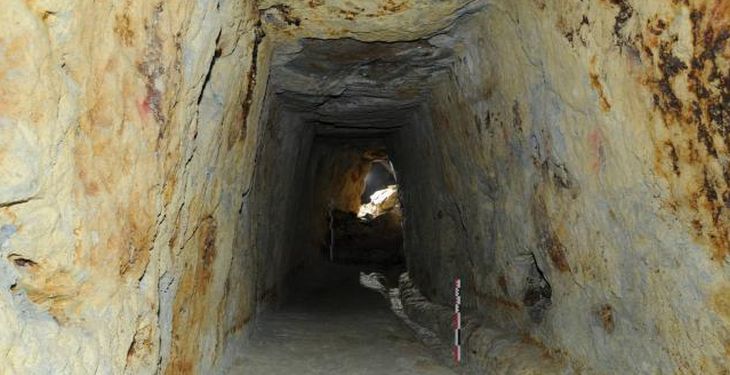Resolving the situation at the Uranium National Company (CNU) can only happen by opening new sites of operation and the company to start again to operate in competitive market conditions, said the Minister of Energy Victor Grigorescu.
“The Uranium National Company (CNU) is a subject that has a primary security component and which I would not have desired in the election campaign, because it’s not right. It’s not a matter of partisanship, but one of importance for everyone. I say to all of those who recommend us to maintain constant the deliveries from the National Uranium Company to Nuclearelectrica at a normal pace, ostensibly to maintain the nuclear cycle completely, that is wrong and that if we did that, it surely would not have been good for the safety of Romania. The return of the company to normality in the area of economic flows will take a long time, because it’s about objective processes, technical endeavors, opening of new perimeters.
At the same time, I firmly believe that the last thing we should do is to consume the resources in order to maintain the safe operation of the power system. Therefore, I believe that resolving the CNU problem is about reopening new perimeters and investments in new technologies. The merger idea of the Uranium National Company with Nuclearelectrica was generous, but who believes this idea is wrong. The Uranium National Company must ensure new perimeters. Normally, this means 3-4 years. From my point of view, the situation of uranium is one of the most resounding failures of the system, a failure at management level, of the public policies,” said Victor Grigorescu in the context of explaining the situation of Romania’s mining sector.
The Ministry of Energy will do its best to maintain the nuclear cycle complete, but the process will be a long one, since that was delayed enormously at the start of the internal procedures at CNU to open new perimeters in order to provide raw materials for the plant at Cernavodă.
“There is no question that we can ensure the necessary energy resources. We will ensure that this nuclear cycle will be maintained. The Uranium National Company extracts today around 10% of the national consumption, which means that we must make the remaining deliveries from the reserves. We are in this stage because we did not do the right thing at the right time. (…) The Company (CNU – n.r.) has initiated internally, the procedures for opening new perimeters. At the moment, there is no question of immediate investment, because there are approvals to be obtained and a new feasibility study to be performed,” said Victor Grigorescu.
The extraction and processing of uranium was subsidized by the state with percentages between 55 and 75% of the cost of production, and the Court of Auditors noted this practice since October 2012. Despite issuing a report in this regard and the referral submitted to the court, the granting of the subsidy continued until December 2015, according to a document issued by the Ministry of Energy.
The practice was interrupted by a final and irrevocable decision of the High Court of Cassation and Justice (HCCJ) in November last year, a decision which obliges the Uranium National Company (CNU) to pay about 3.5 million lei to the state budget. Additionally, a similar lawsuit is pending, covering the period 2012 – 2014, having to contest a report from the Court of Auditors, in which it is determined that the revenue to the State budget was reduced by about 251 million lei, explained the representatives of the ministry.
After the decision of HCCJ, CNU increased the price of the extracted material by 75%, a situation that prompted the leadership of Nuclearelectrica, the beneficiary of the uranium dioxide, to terminate the contract. CNU concluded last year with a loss of about 21 million lei. Earlier this year, the management of CNU was taken over by Gelu Mărăcineanu. For the company management two lines of action were established: identifying the problems that have led to the current situation of the company and finding the solutions to allow the company’s operation under competitive market conditions and without subsidies. Thus, the main measures adopted by the management take into account:
- identifying the role of CNU and the potential to fulfill its mission;
- wavering the uneconomic operation from Crucea-Botușana and its temporary closure;
- starting of required exploitation activities at Tulgeş – Grinţieş;
- restructuring the company in relation to new goals;
- upgrading the production processes to increase yields;
- updating and modernizing procedures and managerial processes.
Ministry of Energy reported the excessive secrecy of the company’s activities, secrecy that went so far that led to unjustified hiding of data that was necessary for the company that provides the financial audit of CNU. Thus, under the pretext that the Court Decision of 2012 is classified as “secret of work”, these were not known by the external auditor. This relieves the external auditor of responsibilities which it usually has. Also, data and information necessary for a normal management process were unduly hidden from the eyes of past board members.
Another problem identified is the practice of incorrect reporting to the control authorities. Thus, situations have been reported that have discrepancies between actual and reported situations, during the checks carried out by the Court of Auditors. This issue was brought to the attention of the criminal investigation organs, say representatives of the Ministry of Energy. In total, the company management has filed three complaints with the competent bodies regarding criminal acts.
